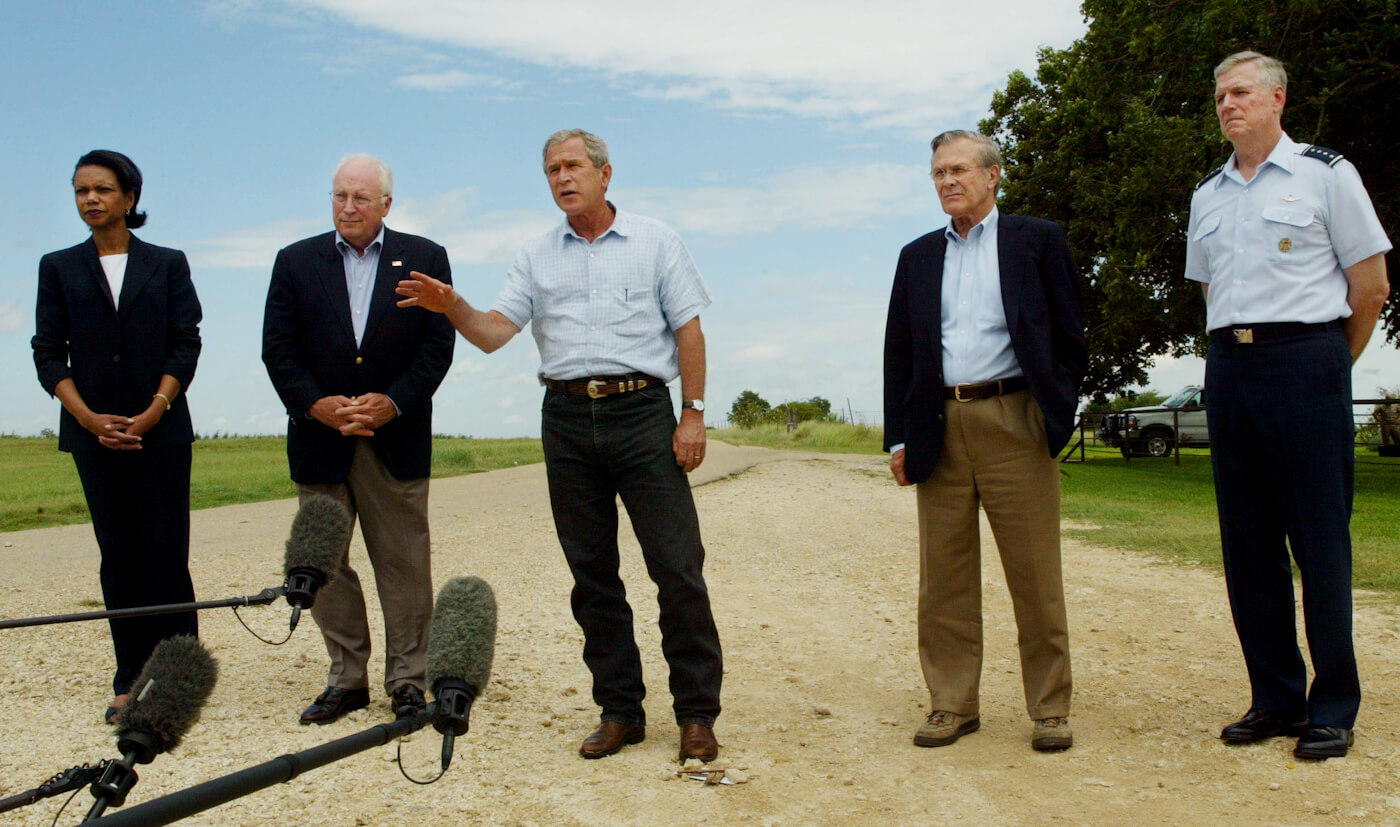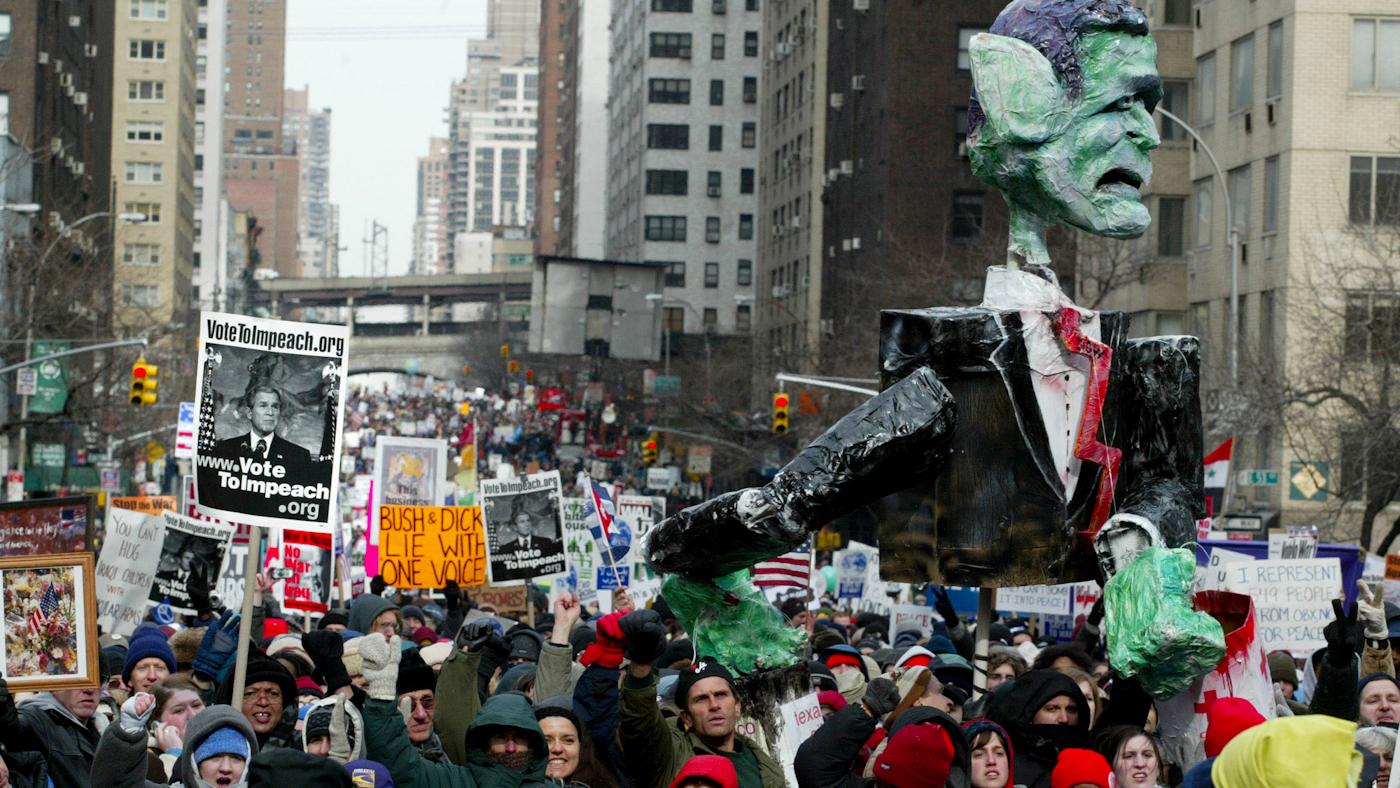WASHINGTON (Opinion) — Sixteen years have passed and the memory of the Iraq War is distant for many, save for the millions of people — Iraqi and American alike — who saw their lives destroyed by one of the greatest lies ever sold to the American public.
Yet, while plenty of Americans sleep easy thinking that such an atrocity as the invasion and occupation of Iraq could never happen again, the U.S. government has continuously been involved in many smaller, equally disastrous wars — both seen and unseen — largely thanks to the fact that those who brought us the Iraq War remain both respected and still present in the halls of power.
Indeed, the only thing the domestic outrage over the Iraq War seemed to accomplish has been a massive effort waged by the government and the corporate elite to engineer a public that doesn’t complain and doesn’t care when their government meddles or invades another country.
For many Americans today, much like the war itself, the outrage over the Iraq War is a distant memory and comparable outrage has failed to emerge over any other U.S. government crime committed or contemplated on a similar scale — whether it be the “regime change” invasion of Libya, the ongoing genocide in Yemen, or in response to crimes the government is now setting up.
Our forgetfulness has informed our silence and our silence is our complicity in the crimes — past and present — orchestrated by the neocons, who never left government after Iraq but instead rebranded themselves and helped to culturally engineer our passivity. As a consequence, we have again been hoodwinked by the neocons, who have transformed America in their image, creating a nation of neocon enablers, a nation of passive neocons.
Iraq War lies revisited
Though the lies that led the U.S. to invade Iraq are well-documented, they deserve to be remembered. A summary of the many lies — including those regarding alleged yet false links between Saddam Hussein and Al Qaeda as well as Saddam’s alleged links to the anthrax attacks and Iraq’s nonexistent nuclear weapons program — can be found here.
Yet arguably more important than the lies told in the direct lead-up to the war, is the conclusive evidence that key officials in the Bush administration, many of them members of the neoconservative organization known as the Project for a New American Century (PNAC), had planned and called for an invasion of Iraq long before the September 11th attacks had even taken place.
Some researchers say the plan for the Iraq War began decades before with the drafting of the 1992 Defense Policy Guidance (DPG), which was overseen by Paul Wolfowitz, then Under-Secretary of Defense for Policy, who would later become one of the chief architects of the 2003 Iraq War. The DPG spoke of the need to secure “access to vital raw materials, primarily Persian Gulf oil.” It also spoke of the need for the U.S. to develop a protocol for unilaterally pursuing interventions abroad, stating that “the United States should be postured to act independently when collective action cannot be orchestrated.”
The DPG would again find prominence among a new group who called themselves the Project for a New American Century (PNAC). Founded in 1997 by Robert Kagan and Bill Kristol, its first act was to publish a statement of principles that promoted “a Reaganite policy of military strength and moral clarity.” That statement was signed by several politically prominent neoconservatives — Wolfowitz, Dick Cheney and Donald Rumsfeld among them.

Bush, center, answers questions from the media while standing with, from left to right, National Security Adviser Condoleezza Rice, Vice President Dick Cheney, Secretary of Defense Donald Rumsfeld, and Joint Chiefs Chairman Richard Myers, about his Iraq War strategy. Pablo Martinez Monsivais | AP
PNAC is arguably best known for publishing the document “Rebuilding America’s Defenses” in September 2000. That document, which cites the DPG as its inspiration, contains many controversial passages, one of which reads:
The United States has for decades sought to play a more permanent role in Gulf regional security. While the unresolved conflict with Iraq provides the immediate justification, the need for a substantial American force presence in the Gulf transcends the issue of the regime of Saddam Hussein.”
After George W. Bush was declared the winner of the 2000 election, many PNAC signatories took prominent positions in his administration, including Cheney and Rumsfeld. Other PNAC signatories — including Dov Zakheim, John Bolton, and Elliott Abrams — would also soon find their way into the Bush administration, where they too would become intimately involved in planning and executing the Iraq War. Notably, Bush’s brother Jeb Bush was also a PNAC signatory.
Once the Bush administration took office, planning for the invasion of Iraq quickly moved ahead, with Saddam’s removal the priority topic during Bush’s inaugural national-security meeting. Former Treasury Secretary Paul O’Neill later recalled that the meeting “was all about finding a way to do it. The president saying, ‘Go find me a way to do this.’”
Just two weeks later, Vice President Dick Cheney — former Halliburton CEO — took the helm of a newly formed energy task force that began secretly meeting with top oil executives. In a matter of weeks, by March 2001, the Pentagon produced a document called “Foreign Suitors for Iraqi Oilfield Contracts” for Cheney’s taskforce, which included potential areas of Iraq primed for exploratory drilling. Notably, other top Bush officials, such as Condoleezza Rice, were, like Cheney, former petroleum industry executives.
Then, just hours after the 9/11 attacks, a Rumsfeld aid wrote: “Best info fast. Judge whether good enough [to] hit SH [Saddam Hussein] @ same time. Not only UBL [Usama bin Laden].”
On September 19, 2001, the Pentagon’s Defense Policy Board, chaired by Richard Perle — another PNAC member — declared that Iraq must be invaded after Afghanistan.
The next day, PNAC, in a letter to Bush, wrote:
Even if evidence does not link Iraq directly to the attack, any strategy aiming at the eradication of terrorism and its sponsors must include a determined effort to remove Saddam Hussein from power.”
It was not until December 2001 that the administration, led by Cheney, had begun to claim that Saddam was linked to Al Qaeda.
Yet, as outlined above, the war plan by then was already well underway.
As the public outrage over the lies and years-old schemes that led to the Iraq war mounted, it was not the exposure of their crimes that riled neoconservatives. Instead, their concern was over the lingering public outrage that severely limited the U.S.’ ability to intervene militarily abroad, leading them to develop more covert operations and other “regime-change” methods aside from outright military intervention. Indeed, Bush had complained that, after Iraq, his “hands were tied,” a reality that prompted him to push the development of secret cyberwarfare programs and the expansion of the drone war, among other new and quieter arrows in the quiver.
In addition to the rise of more covert “regime-change” operations after Iraq, a concerted effort began that aimed to whitewash neoconservatives, particularly the prominent neocons who had been the architects of the Iraq War. These neocons began to rebrand themselves, dumping the now-tainted PNAC in favor of the Foreign Policy Initiative and several other prominent think-tanks that obfuscate their past. Their rebranding has been so successful that PNAC co-founders like Bill Kristol are now considered a part of the Democratic-led “Resistance” to President Donlad Trump.

Jon Lovett, Bill Kristol, Symone Sanders and Jason Miller attend Politicon at The Pasadena Convention Center on Aug. 29, 2017, in Pasadena, Calif. Colin Young-Wolff | Invision | AP
By 2008, the neocons made it clear that rebranding their ideology was the plan, with PNAC co-founder Robert Kagan penning the article “Neocon Nation,” in which, in an effort to whitewash the ideology’s bloodsoaked legacy, he claimed that neoconservatism is “deeply rooted in American history and widely shared by Americans.”
Of course, Kagan’s claim was ironic given that he once criticized Colin Powell for not believing that “the United States should enter conflicts without strong public support,” revealing Kagan’s own disdain for the opinion of the American public. However, his 2008 article shows how, after Iraq, the neocons began waging another war, one for America’s soul.
Obama and “The World the Kagans Made”
After Barack Obama won the 2008 presidential election, many Americans felt that the days of “wars for oil” and wars built on lies would end, particularly after then-President-elect Obama won the Nobel Peace Prize for his warm rhetoric about the need for world peace. Sadly, to this day, many who viscerally opposed the Bush administration’s Iraq War either fail or refuse to acknowledge that Obama was every bit as murderous as his predecessor, though he did so with smooth words, charm and a media-generated personality cult.
While neoconservatives, particularly those who brought us the Iraq War under Bush, are often associated with the Republican Party, the Obama administration — particularly the Hillary Clinton-led State Department — was plugged directly into the same network of neoconservative actors responsible for the destruction of Iraq.
Indeed, upon becoming secretary of state, Clinton quickly appointed Robert Kagan to her 25-member Foreign Affairs Policy Board, a position he continued to hold after John Kerry took over the State Department. Kagan’s book “The World America Made,” was particularly influential on Obama, who cited the book as having inspired his 2012 State of the Union address as well as his 2012 re-election campaign.
Kagan, one of the most influential and prominent neocons of all, served as a State Department official in the Reagan administration and later went on to co-found PNAC in 1997. As early as 1998, Kagan was calling for the U.S. government to “remove Mr. Hussein and his regime from power.” In 2002, Kagan — along with fellow PNAC member Bill Kristol — claimed that Saddam was supporting “a terrorist training camp in Iraq, complete with a Boeing 707 for practicing hijackings, and filled with non-Iraqi radical Muslims.” He also asserted that alleged 9/11 “mastermind” Mohammad Atta had met with Iraqi intelligence just months before September 11. Both allegations were extremely influential in promoting the Iraq War, and both are completely false.
However, Kagan’s troubling track record didn’t stop the Obama administration from giving both Kagan and his wife considerable influence over government policy. In 2011, the Obama administration brought on Kagan’s wife, Victoria Nuland, to serve as State Department spokesperson. Nuland was subsequently given the post of Assistant Secretary of State for European and Eurasian Affairs in 2013, which she used to engineer the 2014 “regime change” coup in Ukraine — an event that continues to have deadly consequences in that country and has even helped bolster Neo-Nazi elements in the United States.
Nuland is a textbook example of the continuity of the neocons from the Bush administration to the Obama administration. From 2003 to 2005, during the Iraq War and subsequent occupation, Nuland was Dick Cheney’s deputy national security advisor. Cheney, thrilled with her performance, recommended she be appointed to serve as U.S. ambassador to NATO. As the executive branch changed management in 2008, Nuland became the special envoy for conventional armed forces in Europe before becoming the Obama state department spokesperson just three years later.
Trump: “Against” the Iraq War But Willingly Surrounded By Iraq War Criminals
Though Donald Trump blasted the Iraq War, and the Bush administration’s role in creating it, on the campaign trail, he — like Obama before him — has invited neocons into his administration since its inception.
Trump’s first secretary of defense, Jim “Mad Dog” Mattis, as well as his first national security advisor, H.R. McMaster, were close to Iraq War architect and influential neocon Paul Wolfowitz — so much so that Wolfowitz was covertly guiding their policy through email correspondence in the early days of the Trump administration.
Mattis’ nomination by Trump was particularly strange given the latter’s frequent criticism of the Iraq War, where Mattis earned his nickname “Mad Dog” after overseeing the 2004 sieges of Fallujah, in which the U.S. military illegally used white phosphorus, a chemical weapon, as well as depleted uranium in the densely populated Iraqi city. As a consequence of the U.S.’ attack over a decade ago, Fallujah’s children continue to be born with horrific birth defects.
While Mattis and McMaster have since departed, the neocons are more powerful than ever in the Trump administration, as seen in the appointment of another PNAC signatory, John Bolton, to the role of national security advisor. In addition, PNAC signatory, Elliot Abrams, was recently named special representative for Venezuela, despite his role in the Iran-Contra affair and in arming Latin American death squads that slaughtered thousands of civilians, and also despite the fact that Abrams is a convicted felon.
A Nation of Enablers
Though they have done their best to hide it, the United States has become a nation governed by and for the neoconservatives and their various corporate clients. The outrage voiced over their crimes in Iraq — to them — was not a call for change but merely an indicator that such outrage must be reduced and silenced, a task since accomplished through cultural engineering and, more recently, censorship.

The bodies of four children killed after their family car came under fire from U.S. troops in Fallujah, Iraq, Sept. 30, 2004. Bilal Hussein | AP
Since the Iraq War, neocons and their allies have used every tool at their disposal to mold us in their image, creating an uncaring nation that feels little or no empathy for the millions murdered and maimed in their name; a nation that is not repulsed by the fact that many of its top public officials are convicted war criminals; a nation that worships war and death and mocks anti-war voices — even when they are themselves war veterans — as “apologists” for foreign leaders who want to keep their countries out of the Pentagon’s crosshairs.
With millions set to die in Yemen from a man-made famine supported by the U.S. and a war being planned for Venezuela, a country that is twice the size of Iraq, our silence and noninterest in these matters is our complicity.
How many millions must neocons and their ilk murder before we say enough is enough? The “War on Terror” alone has already taken an estimated 8 million lives. How many nations will we allow its architects to destroy? We have already laid waste to Afghanistan, Libya, Syria, Iraq, and Somalia; engineered the war in South Sudan; supported the war in Yemen and the destruction of Palestine. Would Venezuela be the “last straw” that finally rouses us to action? It seems unlikely.
The hard truth is that, while the Iraq War may be publicly remembered as an “embarrassment” for the neocons, it was the true beginning of our transformation into a nation of their passive enablers. Regular Americans may not plan and plot forever wars or the destruction of nations and innocent lives, but most certainly go along with it, especially when we are told that “Leader X” kills his own people and “Leader Y” represents a threat to “national security.” Our consent to be governed and guided by madmen has led us to become a nation of passive neocons.
The neocons are still in power and still the public face of American policy only because we allow it. That simple fact means that they will remain in power until we say we have had enough. How many years after the Iraq War will it be before that moment finally arrives?.
Top photo | President Bush gives a “thumbs-up” sign after declaring the end of major combat in Iraq as he speaks aboard the aircraft carrier USS Abraham Lincoln off the California coast, May 1, 2003. J. Scott Applewhite | AP
Whitney Webb is a MintPress News journalist based in Chile. She has contributed to several independent media outlets including Global Research, EcoWatch, the Ron Paul Institute and 21st Century Wire, among others. She has made several radio and television appearances and is the 2019 winner of the Serena Shim Award for Uncompromised Integrity in Journalism.
The post 16 Years After Iraq, the US Has Become a Nation of Passive Neocons appeared first on MintPress News.
